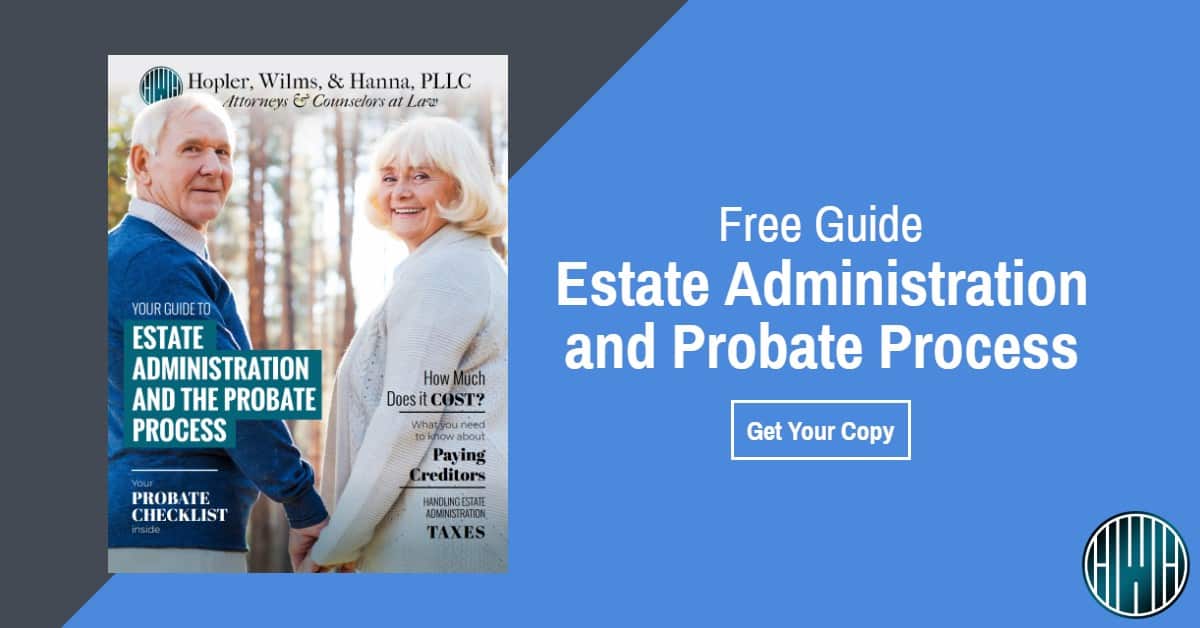When a deceased person’s affairs need to be managed and settled, one of the things that will always need to be addressed is whether the person owed money to any potential creditors. This may include credit card bills, utilities, taxes, and even medical bills. It also may include things like funeral bills, car payments, and equitable distribution claims. Dealing with medical bills can be a very concerning part of the process.
When a person dies, often an estate will need to be opened for them with the Clerk of Superior Court in the county where the person resided, and the elected Clerk of Court serves as the probate judge. The Clerk’s office will provide you with documentation that you need to handle the affairs of your deceased loved-one, and part of your responsibility as the executor or the administrator of the estate will be to notify any potential creditors that they have an opportunity to submit claims against the estate.
This may require you to send a notice by mail with a deadline to submit a claim against the estate within a specified period of time. You’ll also publish a notice in a newspaper for any unknown creditors out there in the world that you wouldn’t have known about with a deadline to submit claims. The newspaper ad serves as a public notice, and major creditors, such as hospital systems and collection agencies, monitor those newspapers.
Communications
For the next few months, you may get communications from debt collectors, hospitals, doctor’s offices, credit card companies, and others. They may very craftily try to convince you to pay or settle their claims right away. It is very important in many cases to not pay things when they come in, but rather hold on to the claims until certain deadlines pass, and then evaluate the claims made against the person’s estate.
Since you won’t necessarily know the total claims that come in, you’ll want to wait until you have all the claims in hand. When you’re evaluating medical bills, you have to take into account some special considerations.
When someone dies and there are not sufficient assets to pay off all debts, then debts are not all paid, and there is an order of priority in determining which debts are paid first. This is the major reason you don’t want to pay anything immediately. If you pay a lower priority debt and then find out you don’t have enough estate assets to pay higher priority debts, you may be personally on the hook for that.
The priority of claims works as follows:
- First class claims are ones which have a lien on property up to the value of the property. Think of the balance on a car note, for example.
- Second class claims include funeral expenses up to $3,500, not counting a burial place or gravestone.
- Third class claims include the cost of a gravestone and suitable burial place up to $1,500.
- Fourth class claims include US government claims, such as taxes.
- Fifth class claims include NC and local government claims, such as local and state taxes.
- Sixth class claims include judgments and if they were docketed prior to DHHS claims, then they take priority over DHHS claims, which are also sixth class claims and are the only exception to a pro rata payment over a class of claims in the event if insufficient assets exist.
- Seventh class claims include wages to employees with some limitations as well as some medical services, which is explained more below.
- Eighth class claims are claims for equitable distribution.
Ninth Class Claim
Everything not listed above would be a ninth class claim, including the remaining cost of the funeral and gravestone/burial site as well as other unsecured creditors.
Medical bills can be a bit convoluted, since medical bills can fall into different spots on that priority list, depending on the circumstances.
In general, the starting point for where on the list medical bills would fall should be that medical bills will fall into the category of ninth class claims, meaning they are dead last in priority along with other unsecured debts, such as credit cards and utilities.
However, one substantial exception is for medical services provided within the 12 months preceding the date of death, as well as for drugs and all other medical supplies necessary for the treatment of the deceased person during the last illness of such deceased person during that time period. This rule lumps a lot of medical bills into the seventh-class claim category instead of the ninth class, which would give medical bills fitting that description priority over other lower-class claims, such as credit cards and equitable distribution claims.
Medicaid and Insurance Claims
Another important exception is if services were provided by the Department of Health and Human Services. You will usually see this when the person was receiving skilled nursing care paid for by Medicaid. Medicaid Estate Recovery may seek reimbursement for services provided, and if so, they are a sixth class creditor, and would take priority over both the medical bills of the final illness in the last 12 months of life as well as other medical bills. Items such as part of the funeral bill, part of the burial marker bill, taxes, and the cost of administering the estate would take priority over both Medicaid and medical bills.
When a claim is made against an estate, medical service providers know that there is a limited window to file a claim, so even if insurance is still pending, they may file a claim demanding the entire amount due, even if ultimately it is expected to be paid by insurance.
For that reason, it is important to check on the insurance status before making payment. It is not unusual to pay a claim and then close an estate, only to find out the creditor did not update their claim, and they issue a refund check to the estate which may require the estate to be reopened. So always make sure to check to see if there is a pending insurance claim before you pay it.
When dealing with a medical claim in an estate, after checking for insurance, you’ll want to either accept the debt as valid and pay it, reject the debt and issue a notice, reject it in part and accept it in part and pay the partial amount, or settle the debt. If you reject a debt, the creditor will have 3 months to sue the estate from receipt of the notice. If they fail to sue during that time period, then the rejected portion of the claim is wiped away.
The last really important concept to consider is the Doctrine of Necessaries. When deciding whether to pay or reject a medical bill as the executor or administrator of an estate, you will want to consider whether the doctrine of necessaries applies. Most debts, if properly rejected and dealt with the estate settlement process, are wiped away when an estate is closed.
However, North Carolina recognizes the Doctrine of Necessaries. The doctrine originated from the legal duty of the husband to provide for the expenses of his wife. Today, it applies to both husbands and wives equally; each can be held liable for the necessary expenses their spouses receive. This gives medical providers the right to claim the surviving spouse as personally liable for medical debt. There are some exceptions, such as if the creditor had actual notice of the fact that the spouses were separated. However, it is a very important factor in considering how to deal with medical debt.
In summary, keep in mind when dealing with medical debts: (1) there may be a duty to notify the medical services provider of their right to collect payment; (2) the claims filed may not include pending insurance payments; (3) you do not want to pay the debt right away because of priority of debt laws; (4) you want to either reject, accept, reject and accept in part, or settle claims; and (5) you want to keep in mind that spouses may be personally liable for medical debts.


